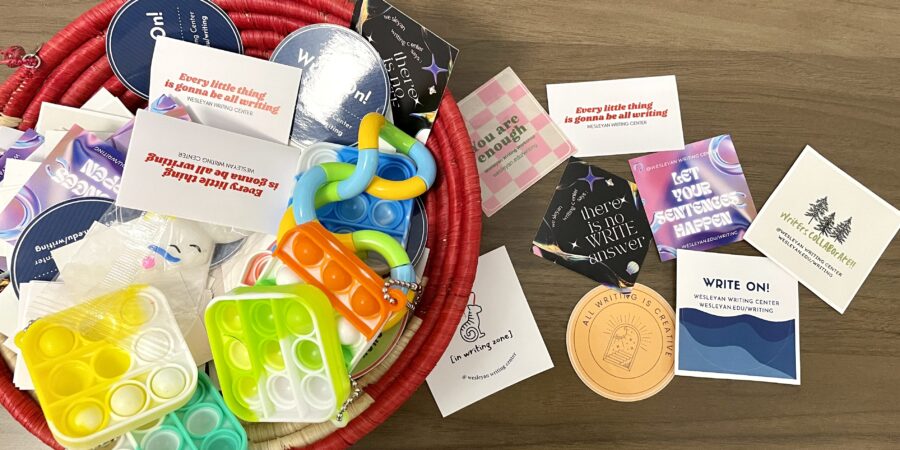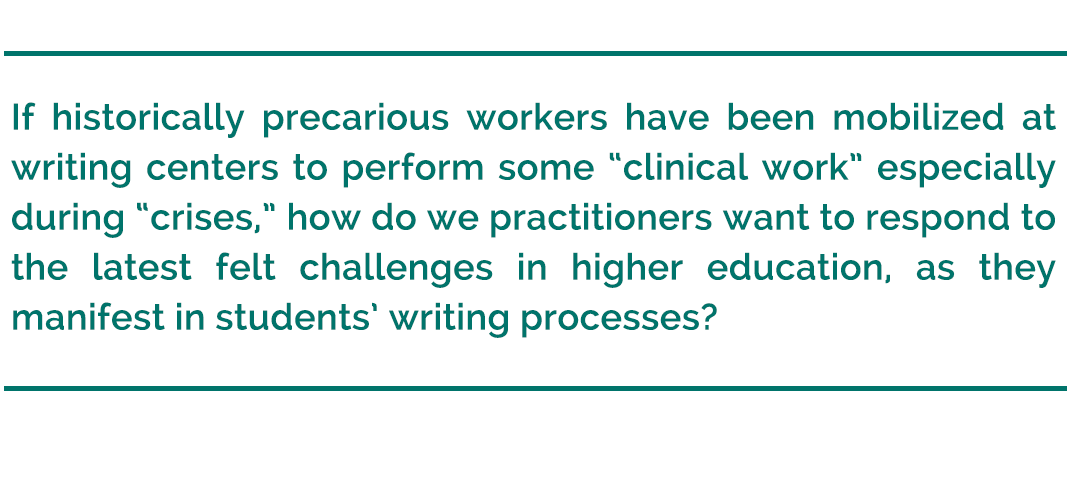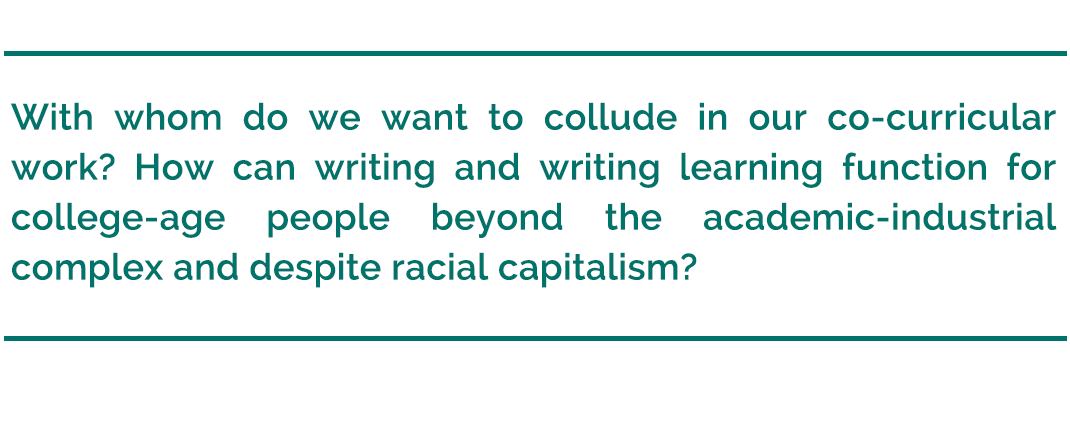By Shaoxuan Tian, Wesleyan University
I forget when and how Lauren—my supervisor and colleague at Wesleyan University’s writing center—and I started to use the phrase “writing trauma.”
“Another sad one with some writing trauma,” she commented on one response to the “How do you describe your relationship with writing?” question in our Writing Mentor program’s application.1 “I’d say yes to this app. A mentoring relationship could help with some confidence boost!”
Working in a liberal arts college’s writing center today, we find ourselves more often accountable to a number of unsettling affective symptoms in students’ writing processes—even more than what is considered the “technical” part. Without any official writing pedagogy, Wesleyan’s “open curriculum” system expects students, regardless of their differential backgrounds within English academia, to pick up writing through practical experiences of completing evaluative works in their chosen coursework. In this “liberal education” framework, students are promised to “freely” explore and develop their writerly selves, but beneath this utopian imaginary, the types of feedback—graded ones—student writers receive are deeply embedded in disciplinary expectations and sometimes instructors’ personal preferences.
Not only do these expectations often contradict each other, but this incoherent mixture confuses and hurts emergent writers as they try to develop their personal relationships to writing. This tension builds up as more industry-based writing expectations also join the scramble for attention: for instance, recently we have seen more students from all class years use writing center sessions for pre-professional writing, from grant/fellowship applications to cover letters. Writers’ needs for sentence-level review intertwine with their struggles to relate to those scrutinizing standards. A non-evaluative teaching space, the writing center has become a primary site where these tensions erupt, and peer mentors/tutors—who are also college students themselves—feel these discomforts especially acutely.2
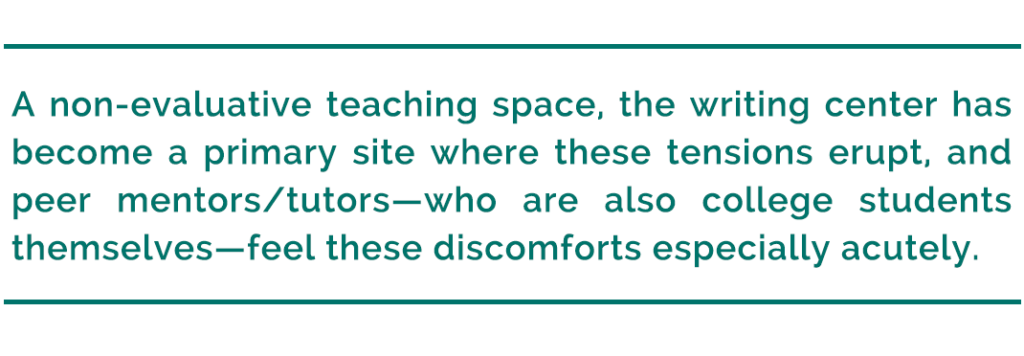
Writing is hard, in and of itself. Writing is also hard, because you “have been studying science” (instead of English?), because you “don’t know everything needed to write” (never the right time), because you “always write with simple words and the languages used are not idiomatic enough” (not the right identity and language backgrounds), because your expressions are “awkward” or “not academic” or “have too much fat” or “use too much evidence,” because you “write too slow, way too slow” while you “have to write more efficiently.” You “try to avoid any writing intensive course as much as possible.” You procrastinate till the very last day before deadline and miss your tutoring appointment guilty of no pages ready for presentation. You station yourself in front of your laptop, but your sentence-in-formation stands otherworldly, ungraspable, dissociated—and then you blush, feeling you owe the world too many apologies for not having those feelings of shame and anxiety under control. I have heard too many similar reactions in my short term working at this college: practice-based writing learning in college today can be a particularly distressing and alienating experience, to which student writers have lasting emotional responses.3
Colloquially developing between the two-people administrator team behind Wesleyan Writing Center’s student-facing programs, the phrase “writing trauma” joins forces to capture an emerging set of student writers’ affective needs we have observed and thus felt compelled to address. What does it indicate when we tacitly pick up on frequently communicating with “writing trauma” to describe our work? What is at stake about the process of learning to write in liberal arts colleges?
Nor is this unintentionally diagnostic tone accidental—born in a time of higher education crisis, US writing centers were introduced as a non-evaluative institutional space for “curing” students with structural underpreparedness and initially named “writing clinics/ labs.”4 If historically contingent workers—from non-tenure track employees to student staff—have been mobilized at writing centers to perform some “clinical work” especially during “crises,” how do we practitioners want to respond to the latest felt challenges in higher education, as they manifest in students’ writing processes? With whom do we want to collude in our co-curricular work? How can writing and writing learning function for college-age people beyond the academic-industrial complex and despite racial capitalism?
I think these are important questions to keep considering even though they cannot be addressed more in this piece. Here I reserve the rest of this blog to share some pondering as I, a first-year writing center manager, experimented with trauma-informed praxis via the example of our center’s fall 2023 semester staff seminar.5 In this writing and writing teaching class for peer mentors, we leveraged our teacherly power to 1) facilitate productive re-processing of personal past writing experiences and cultivate meta-writing awareness; 2) direct rehearsals of writing and writing mentoring experiences of safety, choice, collaboration, trustworthiness, and empowerment; and 3) enforce writing homework explicitly intended to aid everyday writerly, mentorly, and learnerly practices. Within the space below, I try to summarize and present the course’s curricular experience and selectively elaborate on some designs by offering writing activity prompts and annotations.

Indeed, a set of contingent conditions have prompted us to boldly envision what a college writing class could be: for instance, our center is temporarily free of funding pressure; this course is non-evaluative and not-required for our staff, with a half credit barely counting towards any major degree; and our teaching and mentoring are not directly monitored by any institutional performance review for now. Though this curriculum was developed within a particular institutional context, I think sharing this information and how we experimented while in our confusion could be of use to other writing centers. This partial re-curation hopes to ripple some playfulness and skeptical hesitations about current pressures writing center workers face, maybe some ready-to-use classroom scripts, and more conversations that inspire our future practice.
WRCT 400: Staff Training Seminar, Fall 2023
-
Week 1
-
Week 2
-
Week 3
-
Week 4
-
Week 5
-
Week 6
-
Week 7
-
Week 8
-
Week 9
-
Week 10
-
Week 11
-
Week 12
-
Week 13
Week 1: Introduction
This seminar responds to three roles workers occupy at the writing center—writers, mentors, and learners. Together we inquire how writing at Wesleyan is experienced as cultural—we approach writing processes and judge writing works upon a myriad of norms (wk3, wk6, wk10*), rhetorical—we perform different textual genres for discipline-based purposes (wk5, wk8, wk11), and social—we communicate with and influence each other via writing (wk4, wk9, wk12*). As we go through these themed weeks, we will also be practicing various tutoring techniques, developing our tutoring philosophies, and reflecting on our respective literacy histories. We achieve these through a combination of writerly practices: pre-session readings, in-session discussions and activities, end-of-week reflection writing, and a creative final project.
Week 2: Welcome
Preparation:
- excerpt from The Everyday Writing Center: A Community of Practice by Anne Ellen Geller, Michele Eodice, Frankie Condon, Meg Carroll, and Elizabeth H. Bouquet (pp. 5–10)
- three short sections from Naming What We Know: Threshold Concepts of Writing Studies, eds. Linda Adler-Kassner, and Elizabeth Wardle (pp. 17–21, 32–33)
In-session:
- check-in
- 5-minute free-write *
Prompt: Where and when have you been a writer, a learner, and a tutor/mentor respectively? What are some expectations you’ve felt as a writer, learner, or tutor? If you don’t have anything off-the-dome right now, pick up a mundane moment in your life when you were a writer, learner, or tutor. Pick one quote from the reading that makes you think in new ways about what these works require? - reading-based class discussion on the three roles, cross-overs, and the idea of the writing center as a “contact zone”
- review syllabus
End-of-week reflection:
- setting 2–3 goals as a writer, mentor/tutor, and learner
* “Free-write” is an activity we frequently use at our center. As the name suggests, writers are instructed to freely keep dumping whatever’s on their mind in typo-ed words, broken sentences, multiple languages, scripts that might only make sense to themselves, etc. non-stop for a timed period. Often the prompt is mainly used as a meditation guide not expected to be sufficiently addressed. I usually read it twice as people start writing. //
Week 3: language~identity~ideology + writing
Preparation:
- Jamila Lyiscott’s TED talk Three Ways to Speak English
- Tony Scott, “3.0 Writing Enacts and Creates Identities and Ideologies,” in Naming What We Know (pp. 48–50)
- Mandy Suhr-Sytsma and Shan-Estelle Brown, “Theory In/To Practice: Addressing the Everyday Language of Oppression in the Writing Center” (pp. 13–18)
- Bring a piece of writing you think is good/successful (genre/discipline: whatever; format: whatever)
In-session:
- check-in
Did you have a mentoring session this week? If so, what happened? DESCRIBE the session and then REFLECT on it—what made it “successful” or not in your opinion? Where do your ideas about a successful session come from?
- Annotation activity
Prompt: Spend 10 minutes annotating on the successful piece you’ve prepared. Reading it again this time, what stands out to you? Circle/comment passages you like/dislike or think are well-written, word choices you vibe with, phrases you feel confused about, flows/arguments you find inspiring, etc. - 5-minute free-write
(1) Look at the annotations you made just now, can you find any patterns in what you like/dislike/appreciate in this piece? Based on this, what are some elements you value/appreciate in writing works in general? In other words, what are some successful writing criteria of your own?
(2) Any identities or educational backgrounds that play into how you pick up these criteria? Why do you think they are important to you when appreciating a piece
(3) Pull out a quote from today’s readings that makes you think differently about these success criteria in writing and the use of a language? - debriefing the annotation activity in pairs of two + whole class reading discussion
End-of-week reflection:
- tutoring philosophy analysis
Week 4: Personal Literacy Story
Preparation:
- Claire Vaye Watkins, “On Pandering”
- Joy Harjo, “I Used to Think A Poem Could Become A Flower”
- excerpt from “How I Write” by Alexandra Gillespie
- excerpt “In Search of the Self As Hero: Confetti Of Voices on New Year’s Night, A Letter to Myself” by Nellie Wong
In-session:
- check-in
- free-write/draw: in 7 minutes, draw a river of your literacy journey (as people draw, handwrite the poem “Delta” by Adrienne Rich on the board)
Prompt: When did you start to read and write as you can remember? Where were you? How have your reading and practices changed or not changed over time? Are there any particularly memorable events in your literacy development? Pick one influence that you see moving through your life as a writer, and trace that thread’s development? What are some forces beneath it that you can identify?
- partner talk/debrief
- large-group discussion + small-group activity (with a focus on how, in each reading, the writer reflects on their pasts to see their present writerly styles and/or imagine the kind of writers they want to be)
End-of-week reflection:
- literacy narrative
Prompt: Pick one reading from this week that you feel inspired by. Imitate their style to produce a short piece of writing where you imagine and explain what kind of writer you want to be. This can mention/allude to your past literacy stories that we discussed in session, relational/personal/cultural commitments you see yourself being writing for, but should be future oriented in nature.
Week 5: Writing and Writing Mentoring in the Social Sciences**
Preparation:
- Bonnie D. Devet, “Using Meta-genre and Eco-composition to Train Writing Center Tutors for Writing in the Disciplines”
- bring one piece of writing you’ve produced for a social science course
In-session:
- check-in: prompting people’s tutoring experiences working with students whose work are in unfamiliar disciplines/ divisions/ genres
- small-group workshop on the writing works students bring, with a focus on the context of its being produced, genres and disciplines and corresponding expectations, similarities and differences, breaking-down writing tasks involved
- reading-based lecture on various cognitive tasks in writing; generalist, specialist, and meta-genre approaches to mentoring/mentor training
- whole class discussion proposing how people want to be trained at our center
End-of-week reflection:
- tutoring technique practice
** We chose to follow Wesleyan’s official division of natural science and mathematics, social sciences, and humanities—how discipline-based writing is locally experienced, but also invite people to think above-and-beyond.
Week 6: Languaging and Writing Across Contact Zones
Preparation:
- Robyn Myers, “Guests and Hosts”
- Yiyun Li, “To Speak Is to Blunder”
- Bring a client report form from a session you’ve done and print it out
In-session:
- check-in
- 5-minute free-write
- large-group discussion: what makes one a host or a guest (feelings?) what makes one a host or a guest in a language, a writing process, a piece of work?
- small-group discussion on being guest/ host in writing and mentoring contexts
- client report form analysis activity
End-of-week reflection:
- tutoring technique practice
Prompt: Write a boundary statement for your tutoring session. Refer to our discussions on feeling being guests, hosts (and/or ghosts, as one of your peers added) in a mentee’s writing process, a mentoring session, the writing center space, a particular discipline/genre, English academic language, etc. Name some things you are comfortable or not comfortable doing? Feel free to share this with your mentees/tutees!
Week 7: Midterm Week
- no class
- small-group check-ins for all writing center staff
- mid-term reflection essay
Prompt:
- In 2–3 pages (double-spaced):
(1) Explain how you approach your work at the Writing Center with vocabularies we developed here so far. Pick 1–2 terms/concepts/metaphors (or a set of them) that stick out to you from our class materials and write through: what are they and what do they mean, per your understanding? How would you describe your approach to writing/tutoring/learning employing them? How have reflections around them shaped your work thus far this semester? (meta moment on teaching: we’re doing cognitive scaffolding for ourselves!)
(2) Go back to your goals. First remind yourself what they are. Where do you see yourself in achieving them thus far, by your own measure? Do you want to change/add/trim your semester goals based on your updated knowledge about your learning rhythm and this class now—in other words, what goals do you have for the rest of the semester as a writer-learner-worker? How can instructors support you with those goals?
(3) Based on these reflections, what are 1–2 questions/confusions you have regarding the themes we’ve touched on, either pertaining to the more conceptual discussions or specific tutoring situations?
Week 8: Writing and Writing Mentoring in the Natural Sciences
Preparation:
- Brandy Ball Blake, “From STEM to Center: Or What I Learned from Tutoring Engineers”
- “The Science of Scientific Writing,” published on American Scientist
In-session:
- check-in
- free-write around mentoring, being mentored, or working on a natural science class’s writing project
- whole-class discussion on deciphering the process of science-y writing, and their audiences, at Wesleyan and beyond, and their similarities to writing in other divisions + discussion on how do people think about specialist/ generalist/ meta-genre approach to mentor training at writing centers based on today’s discussion
End-of-week reflection:
- tutoring philosophy analysis)
Prompt: Create one shareable tidbit about science writing or science tutoring that you learned from this week’s readings that you want to share with other Writing Center staff. Explain the how-to and why you think it’s worthy to include in their tutoring approach/ philosophy.
Week 9: Cyborg Writers?
Preparation:
- Jillian Weise’s “Common Cyborg”
- the BBC’s “Simple Guide to AI”
- If you need some more explanation/background on AI, check out the background provided by the Writing Across the Curriculum Clearinghouse.
In-session:
- check-in
- a mini-lecture on large language models and some recent AI-related discussions in writing centers + discussion
End-of-week reflection:
- literacy narrative
Week 10: Canceled
(Sometimes this helps, too.)
Week 11: Writing and Mentoring Creative Works
Preparation:
- none
In-session:
- check-in
- small-group defining creative writing terms “character,” “plot,” and “setting,” respectively
- whole class revising of our collective definitions + discussion on how these language tools could be used to describe writing process across all disciplines + mentoring takeaway (for instance, working with creative writers who fear science analysis)
- brainstorming workshop on students’ individual final projects employing these tools. (The project asks students to share a bit of knowledge we’ve developed in this course with a target audience through a submittable work.)
End-of-week reflection:
- used to help people further outlining their final projects
Week 12
- changed to a final project co-writing workshop
Week 13: last meeting
final project presentation + general review
final reflection essay
- a literacy narrative for this semester
- The Writing Mentor program is a non-evaluative semester-long weekly tutorial to which Wesleyan students can apply to be paired to work with one trained peer mentor. ↩︎
- Currently at Wesleyan’s Writing Center, “writing mentor” refers to peer staff working for semester-long weekly one-on-one tutorials through the Writing Mentor program, while “writing tutor” refers to those working in one-time appointment-based situations. ↩︎
- This paragraph is performed with data from student responses to the Writing Mentor program application, my own mentoring conversations, and peer staff’s post-meeting report forms during the 2023 to 2024 academic year. ↩︎
- For a summary read of writing center history and its development paralleling that of US higher education, please check out this recent piece “The College Writing Center in Times of Crises” by Genie Giaimo (Middlebury College’s writing center director) ↩︎
- Besides reflecting on my first-hand experiences, I also owe credit to my exposure to disability studies, feminist/queer-of-color analyses, critical rhetoric and composition, and recent discussions of trauma-informed care in medicine, in designing this curricular journey. ↩︎
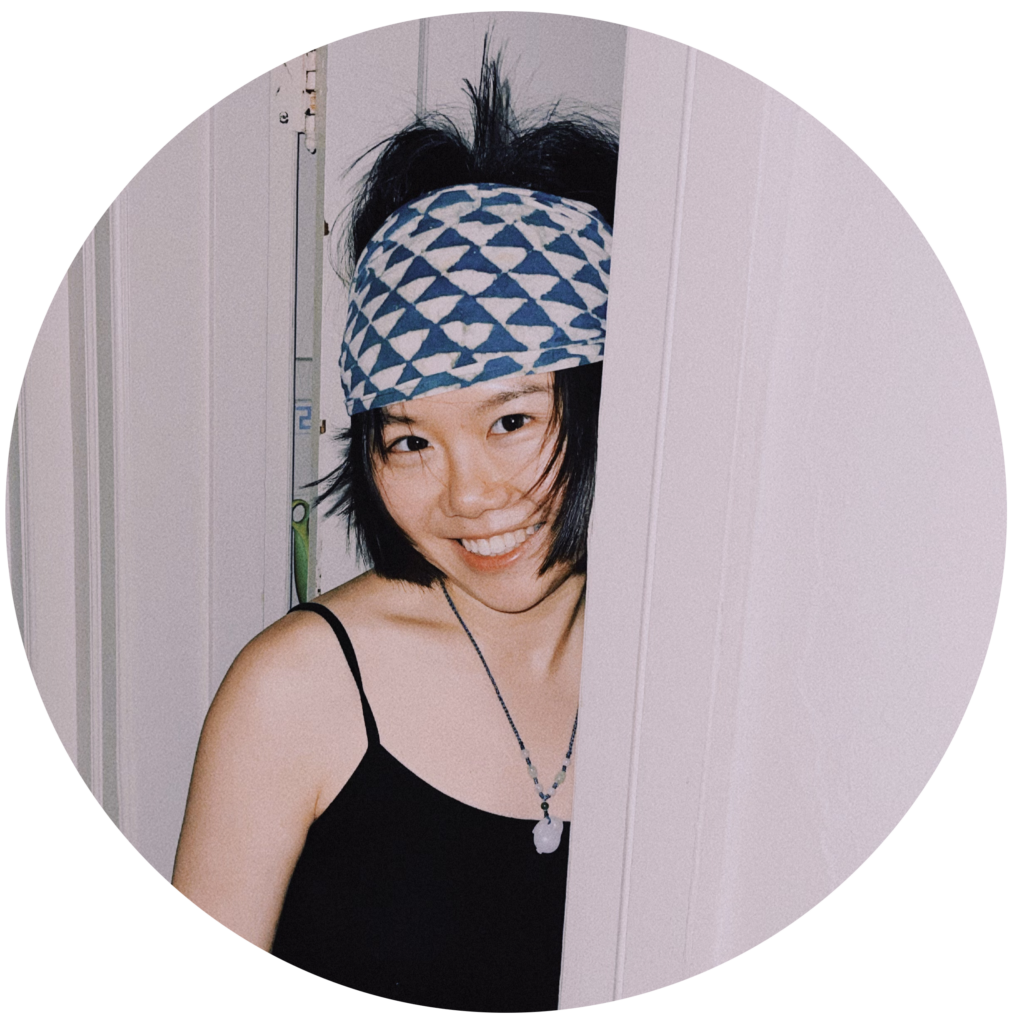
Shaoxuan Tian currently works full-time for a fellow position with assistant-director tasks at Wesleyan University’s writing center, where she worked as a peer mentor before graduation. She doesn’t dare say she wants to be a writer, fearing that she probably started writing too late; nonetheless, she continues feeling compelled to write. She has a walking-thinking pattern and appreciates early mornings in her processing, finds herself in between the kids’ section and recipe shelves in bookstores, and terribly wants to foster a cat.

